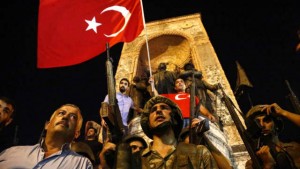Home » Commentary » Opinion » The Coup, The Dictator, and Democracy?
· Ideas@TheCentre
 Erdogan refusing this week to release the body of a ‘traitor’ teacher for burial highlights just how brutal the divorce between democracy and Turkey has become.
Erdogan refusing this week to release the body of a ‘traitor’ teacher for burial highlights just how brutal the divorce between democracy and Turkey has become.
After years of undemocratic violations, Erdogan’s post-coup purge of perceived enemies has finally tipped the scale to an authoritarian state. As images of civilian assaults on Turkish soldiers emerged, questions arose about how Erdogan was able to mobilise such a large group of citizens. The answer lies in his use of divisive rhetoric to rally the yobaz (intolerant and ignorant Muslims) constituency.
As he steered Turkey toward being an authoritarian-based theocracy, his dialogue has been seeded with radical anti-western ideology, paranoia and Ottomanism. An early predictor of the current purge came in 2013, when the Gezi Park Protests escalated the campaign against any opposition.
Erdogan demonised protestors, labelling them capulcus (looters) who were allegedly working with foreign parties to undermine his authority and aimed to overthrow him — leading to counter protests in his support. Surviving a nationwide protest that called for his resignation, Erdogan was given a ‘gift from God’ to quash any opposition in the form of the recent coup.
Broadcast on CNN Turk, Erdogan summoned supporters to take to the streets and defend Turkey against Gulenists. Meanwhile, his government sent texts and sounded the call to prayer from mosques as a way to mobilise people, resulting in mobs of civilian men beating, arresting, and — in some cases — killing soldiers.
By declaring a three-month state of emergency, Erdogan now rules by decree and can bypass parliament with no opposition. His cleansing of Turkey has resulted in the imprisonment and suspension of close to 70,000 individuals, many of whom have no links to the Gulen Movement. Further, he has suspended the EU Convention on Human Rights with evidence emerging that detainees are being abused, tortured and in some cases raped.
Violence, authoritarianism and paranoia would not be plaguing Turkey if democracy existed. Opposition would be tolerated, freedom of speech, expression and press would exist; and human rights would not be violated. To those who claim that some form of democracy still exists in Turkey, even the most cursory glance at the facts should reveal that Erdogan and his supporters have not just divorced democracy. They have crucified it.
Yonca Yilmaz is the Executive Assistant at the Centre for Independent Studies, and is completing her PhD thesis The Gulen Movement: A Civic Society Movement without Borders.
The Coup, The Dictator, and Democracy?